When you’re interviewing for a job you really want, there’s no worse feeling than being unable to answer a difficult question. And, of course, since they’re usually complex or technical, they’re the questions you need to know how to answer. What you say—or don’t say—could determine whether you land the job. We’ve rounded up seven examples of technical interview questions to help you prepare.
1. Tell Me About Yourself
At first glance, this doesn’t seem like a complicated question. But telling an interviewer your entire life story would take way too long. You definitely don’t want to do that. So what do you say?
Here’s the secret. When an interviewer says, “Tell me about yourself,” they want a one to two-minute synopsis that captures your:
- Education
- Career history
- Recent work experience
- Career goals
Before the day of your interview, prepare notes to help you provide a snapshot of your life to a potential employer. Think back through each of these periods of time and jot down two or three points for each.
This is an excellent time to study your resume or curriculum vitae (CV), particularly if a lot of time has passed since you worked on it. A resume-building tool like Zety can help you build and edit an appealing resume.
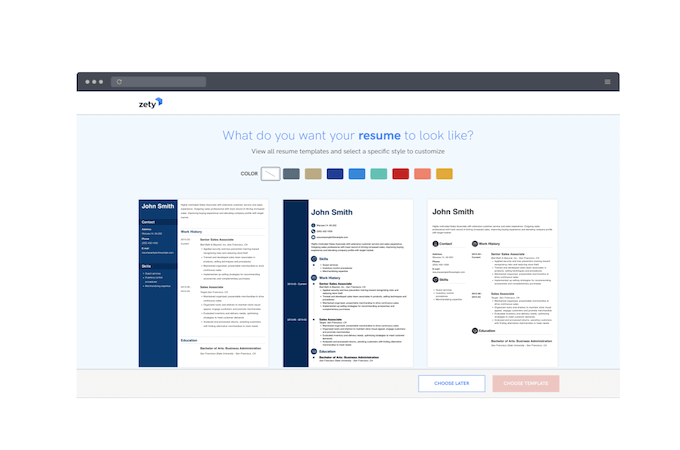
Practice your response to the simple yet complex question, “Tell me about yourself,” several times before the big day and you’ll be ready to go.
2. Why Do You Want to Work Here?
You’re almost certain to get hit with this question or something similar. To answer it, you’ll need to spend time researching the company.
Familiarize yourself with the company’s management, which you can usually find on the About page of a website. Learn the organization’s mission and values. Explore its social media pages. Search the internet for articles about the company—recent news that you can weave into your answer.
In short, find out everything you can about the place.
Say you’re interviewing for a social media management position at Capital One, for example. You could navigate to the footer menu and explore every link in the Get to Know Us section.
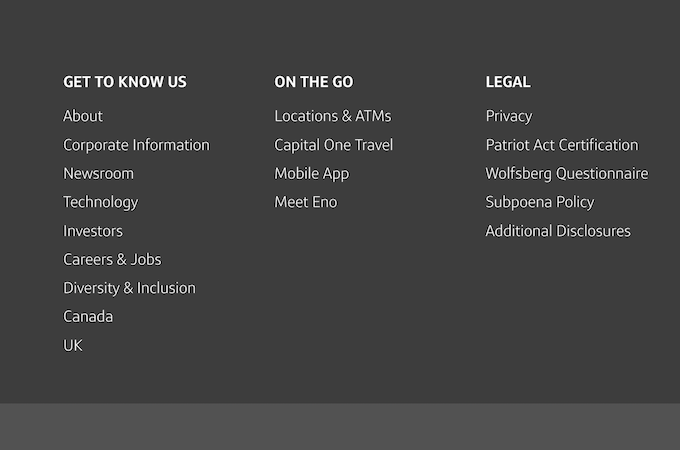
Take note of two or three company strengths and one need. Draft an answer that includes these points and explores how you connect with them. But—and this is extremely important—frame the answer in a way that does not put the organization down.
Don’t say:
I like how your company focuses on making banking accessible to everyone. It’s clear from your social media posts that you go out of your way to make life special for cardholders. From free coffee on Election Day to airport lounges for weary travelers to concert ticket pre-sales, your focus on bringing joy to Capital One customers is amazing.
But your social media game could use some help. There’s a lot of baseball stuff packed into your Twitter feed, and it’s not very on-brand for you. I want to help you reach more consumers with a wider variety of posts.
Instead, try:
I like how your company focuses on making banking accessible to everyone. It’s clear from your social media posts that you go out of your way to make life special for cardholders. From free coffee on Election Day to airport lounges for weary travelers to concert ticket pre-sales, your focus on bringing joy to Capital One customers is amazing.
Your company makes something daunting, like banking, more relatable and friendly. I’d love to bring my passion and skills to your social media accounts, where I could highlight new ways to connect with the Capital One audience.
In short, your goal is to identify two or three core company strengths that show you’ve done your research. Then describe where your services fit in, briefly explaining how you could help the company continue to thrive.
3. What Career Accomplishments Are You Most Proud Of?
An interviewer might ask you this question or one of its variations, such as “What three accomplishments are you most proud of in your current/past job?” or “What five career accomplishments make you feel proud when you look back at them?” or “What is your greatest achievement?”
Regardless of the question, the hiring manager most likely wants to know three things:
- What you value in a job
- Whether or not you’re a success-oriented worker
- How your past achievements align with the position at their company
The response you give must answer each of these questions—while keeping the overall response at one to two minutes in length.
Before the interview, spend time thinking about what’s made you feel proud in your career so far. Look closely at your past two to three years of job history. Highlight instances in which you helped a previous organization grow or succeed in some way.
Let’s say you work in the nonprofit sector. Did you lead a team in creating a new program to serve your local school district’s after-school care needs? Or did you successfully launch and run a health fair that gave hundreds of people access to on-the-spot screenings and blood tests?
Write these achievements down. Next, take a look at the organization’s mission statement or company goals. Do your achievements connect with the company’s core values? If so, highlight this in the answer you prepare for your interview.
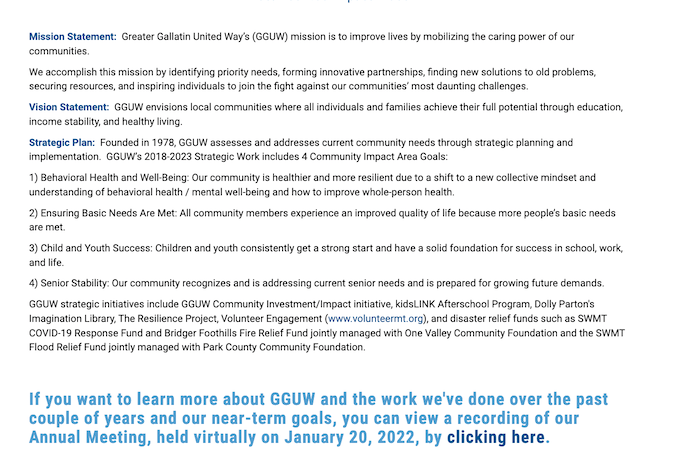
We recommend choosing at least five career accomplishments to help you feel prepared for this technical interview question.
Finally, when an interviewer asks you about your greatest accomplishments, avoid these mistakes:
- Talking about personal achievements, such as traveling the world or having a child—you’ll be able to share more of your personal life if you wish when you get hired, but it’s not relevant for an interview
- Bragging about yourself—work on highlighting your strengths without sounding boastful, and make sure to relate how you worked with your team to achieve great things
- Going off on a long tangent
- Lying about accomplishments to make yourself look better
Preparation is key to avoiding these mistakes. If you’re in the middle of an interview and don’t know what to say, ask for a few moments to recollect an accomplishment before giving the best answer you can.
4. What Key Trends Do You Notice in This Industry?
This question helps your employer understand how well you know your field of work. As with many types of technical interview questions, answering this question takes some preparation.
Before you run to Google, take a moment to ask yourself what you already know. If you’ve been working in one industry for several years, chances are you know quite a bit about important industry trends.
Let’s say you work in healthcare. If you’ve been in the business since before 2019, you know that COVID-19 ignited several key trends:
- Telemedicine: From virtual psychiatry appointments to telehealth-led eye exams, the boom in telemedicine has benefited society and multiple ways, and it only keeps expanding healthcare opportunities for patients everywhere
- Healthcare consumerism: Smart, health-tracking watches and phones were around before COVID-19, but combined with the boom in at-home rapid tests for COVID, consumers are more interested in—and knowledgeable about—their health than ever before
- Electronic medical records: Keeping patient records on paper is nearly a thing of the past as more and more providers move records onto the cloud, where they allow providers easy access to critical information and help streamline workflows
If you work in healthcare, you know these trends. With a little bit of practice before an interview, you can talk about each one—and you can tell a recruiter that keeping up with ever-changing medical technology is one of your strengths.
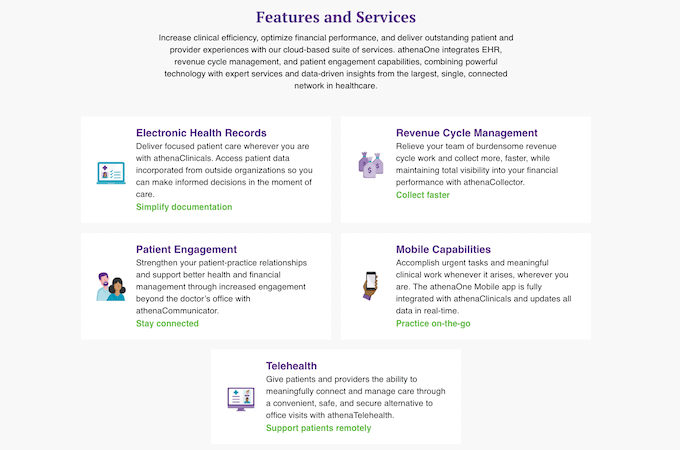
Use your own knowledge, along with information gleaned from the internet, to write down three or four trends you notice in your industry. Explore trends in technology, legislation, and the industry’s economy. Practice speaking briefly about each trend to a hiring manager, and you’ll be ready for this technical interview question.
5. Why Are You Leaving Your Last Position?
This question might feel intrusive to an interviewee, but it’s common. Interviewers want to know if you’ll be an asset or a liability to their organization. It makes sense that they’d ask this technical interview question.
You’ll need to walk a fine line between giving truthful answers without hurting your reputation—or your previous employer’s.
Here are a few common reasons for leaving a job, along with a brief sample answer that can help satisfy an interviewer:
- You’ve been laid off. Say so! Express your regret at having to leave a job you loved, but express your excitement at bringing your skills and experience with you to a new position.
- There wasn’t enough room for growth. If you felt that your previous position wasn’t leading anywhere meaningful for you, tell the interviewer that you enjoyed your time at your previous position but felt ready to move forward in your career.
- You’ve decided to leave due to a personal conflict. Whatever you do, don’t bash your former boss or coworkers. Instead, focus on career advancement—mention that you value your time spent at the position but left because you were ready to take the next steps in your career.
- You’ve been terminated. This is a tricky one, but diplomacy is key. Briefly explain why you were let go. Tell the interviewer how you have incorporated feedback from your former boss. Explain the ways you will implement what you learned from the experience in a new role.
No matter what, focus on the exciting things you’ll do in your next role, not on what you dislike about your past job.
6. You’ve Been Given a Giraffe. You Can’t Sell It or Give It Away. What Would You Do With Your New Giraffe?
Unexpected and seemingly irrelevant questions can throw you off your feet, but they’re important to prepare for. Instead of preparing answers for questions like the one in this header, however, you simply need to prepare for the possibility of being asked these creative questions.
An answer to the giraffe question, for example, could be that you’d build it an enclosure fit to rival the best zoo and learn everything in the world about giraffe care. Maybe you’d take it swimming in the ocean so its long legs could fend off sharks.
There’s no right or wrong answer. The point is that a question like this helps an interviewer get a glimpse of your personality—and observe what you do when faced with the unexpected.
Other off-the-cuff questions might measure your logic and wit, like “How many pennies would fill up this room?” Faced with this impossible question, you could simply tell the interviewer how you’d solve it with basic math.
Just knowing that you might get a question like this during an interview is preparation enough. Researching similar questions beforehand and preparing answers for them takes away from what your interviewer is trying to do.
Instead, try to get excited about the chance to showcase your personality and problem-solving skills. But we won’t tell anyone if you peek at some of the most common silly interview questions.
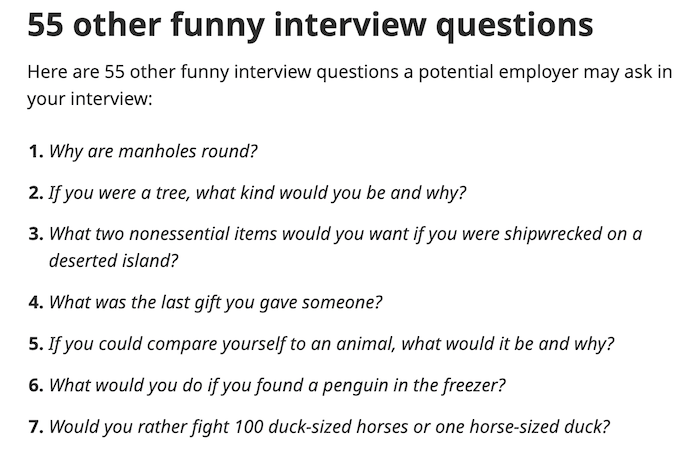
They’re quite entertaining.
7. Why Should We Hire You?
Every interview question you answer helps a hiring manager get closer to the answer to this question. But sometimes you’ll get asked the question point-blank.
The interviewer is probably interviewing several candidates who qualify for the job just as much as—or more than—you do. This question gives you a chance to stand out from the pack.
We have five tips to help you prepare a good answer:
- Briefly highlight the skills, strengths, and past experience that would make you a great fit for the role
- Outline what you understand of the company culture and show how you’d fit in
- Explain how hiring you would help the company excel at its goals
Re-read the job posting, keeping an eye out for areas the company wants to improve. Show how your accomplishments from previous jobs would help you fill those needs.
For example, if you want to work as a product reviewer and the job listing mentions TikTok experience, you could tell the recruiter about the time you created a TikTok for a client that garnered 200,000 views and 50 comments.
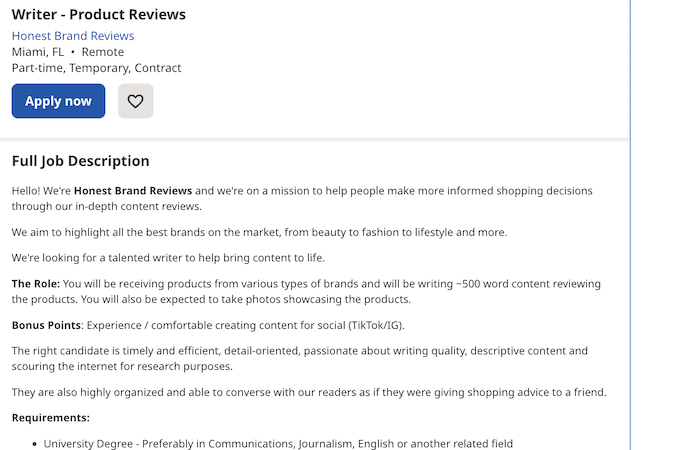
Just make sure you use only truthful examples, and be prepared to provide proof!
Final Thoughts About Technical Interview Questions
Interviewing is stressful, but preparing for the toughest questions you might get asked can help you feel calm. By taking the time to draft thoughtful answers for a wide range of questions, you prepare yourself for just about anything the recruiter or hiring manager throws your way.
Many interview questions are just variations of each other, after all. And they all help the interviewer and interviewee discover the answer to one question: do this job and this candidate make a good match?
